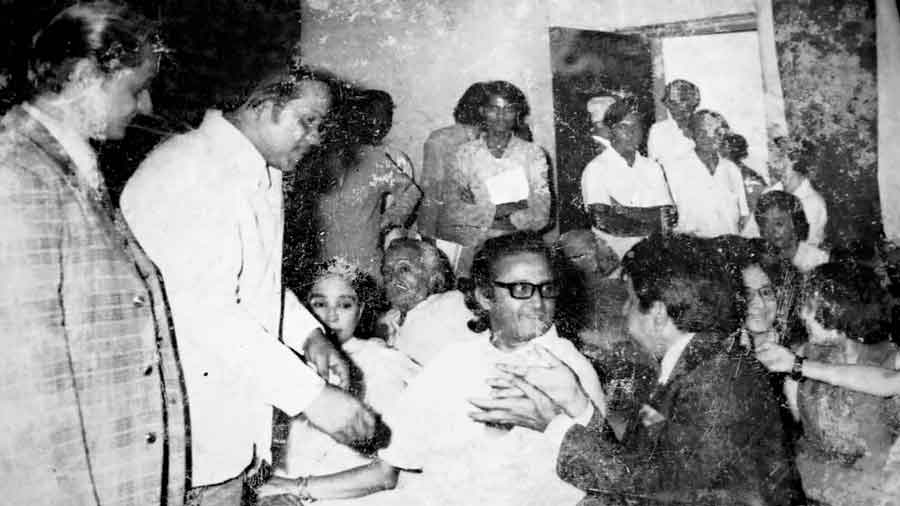Darjeeling had almost played Cupid in the fabled marriage of Dilip Kumar and Saira Banu that withstood the test of time and raised the bar for film couples.
Pratap Chand Agarwal, now 86 and the couple’s family friend from Kurseong, told this paper hours after the legendary thespian bowed out from the stage of life at age 98, a hitherto unknown fact of one of the most talked-about marriages in Bollywood.
Agarwal, a producer of the award-winning children’s film Safed Haathi that had Shatrughan Sinha in the cast, said that he had arranged the shooting of Jhuk Gaya Aasman that had Rajendra Kumar and Saira Banu in the lead roles, in Darjeeling in the mid-60s.
“When the shooting was at its fag end, Saira Banu told me one evening that she would introduce me to Dilip Kumar and we went to his hotel room at Mount Everest Hotel,” said Agarwal.
Dilip Kumar, born Mohammed Yusuf Khan, was not a part of the Jhuk Gaya Aasman cast.
“Yusuf bhai had come on his own to meet Saira Banu and had taken a separate room in the same hotel where the directors and actors of Jhuk Gaya Aasman were staying. Following a brief interaction, Yusuf bhai told me, ‘I am getting married to Saira Banu’. He seemed to have come to Darjeeling just to finalise the marriage,” Agarwal said.
From Darjeeling, the couplethen left for Bhutan, recalled Agarwal.
The two tied the knot on October 11, 1966. Dilip Kumar was 44 and Saira Banu 22. Many chinwags had commented on the age difference. But it would prove to be one of the most enduring marriages in the Indian film industry.
After their marriage, the couple did visit Darjeeling hills twice in the late 1960s to shoot for the famous Bengali film Sagina Mahato that released in 1970.
“I used to meet them almost everyday. I arranged their stay at the bungalow of (parliamentarian) Ila Pal Chowdhury at Gayabari in Kurseong. The shooting took place mostly in Tindharia, at the railway workshop and the DHR rail loop,” said Agarwal.
Agarwal organised a party with prominent citizens of Kurseong at the electricity department Dak Bungalow during the shoot. In the early 1970s, the couple again returned to Kurseong for a remake of the film into Hindi named Sagina, which went on to release in 1974.
On one occasion, they came to Agarwal’s house at Rajbari in Kurseong for lunch, he recalled.
For all his stardom, Dilip Kumar, Agarwal recalled, was an extremely down-to-earth man with a big heart.
“In 1977 I went to Bombay and fell ill. I called him at around 5.30 am in the morning and he immediately sent two of his attendants to get me admitted at Nanavati hospital,” recalled Agarwal. “By 7.30am he was personally present at the hospital. He visited me on all three days of my hospitalisation.”
Agarwal, who is also a former chairman of Kurseong municipality said that Dilip Kumar and Saira Banu had done their bit to raise funds for the SD Dey Sanatorium in Kurseong.
“In 1975, the duo attended a charity event organised by the Sagina Mahato team at the Light House Cinema Hall in Calcutta and we raised Rs 74,000. A Tibetan painting I had taken from Darjeeling fetched Rs 10,000 at the event,” said Agarwal.
Dilip Kumar had donated Rs 2,000 to Anjuman-E-Islamia, a Darjeeling mosque, recalled Akhtar Ali, a retired government employee, ow 80, who had also seen the couple in their heyday.
Agarwal said that he last visited Dilip Kumar in Mumbai in 1992.
The thespian was already not in the best of health, he recalled.
“I’d first seen Dilip Kumar in person when he had come to shoot for the film Naya Daur at Kurseong in 1957. I was a young man then. Today, in my twilight, I heard the news of his demise. I am sad but I will cherish my time with the legend who was for me simply Yusuf bhai,” said the octogenarian.











